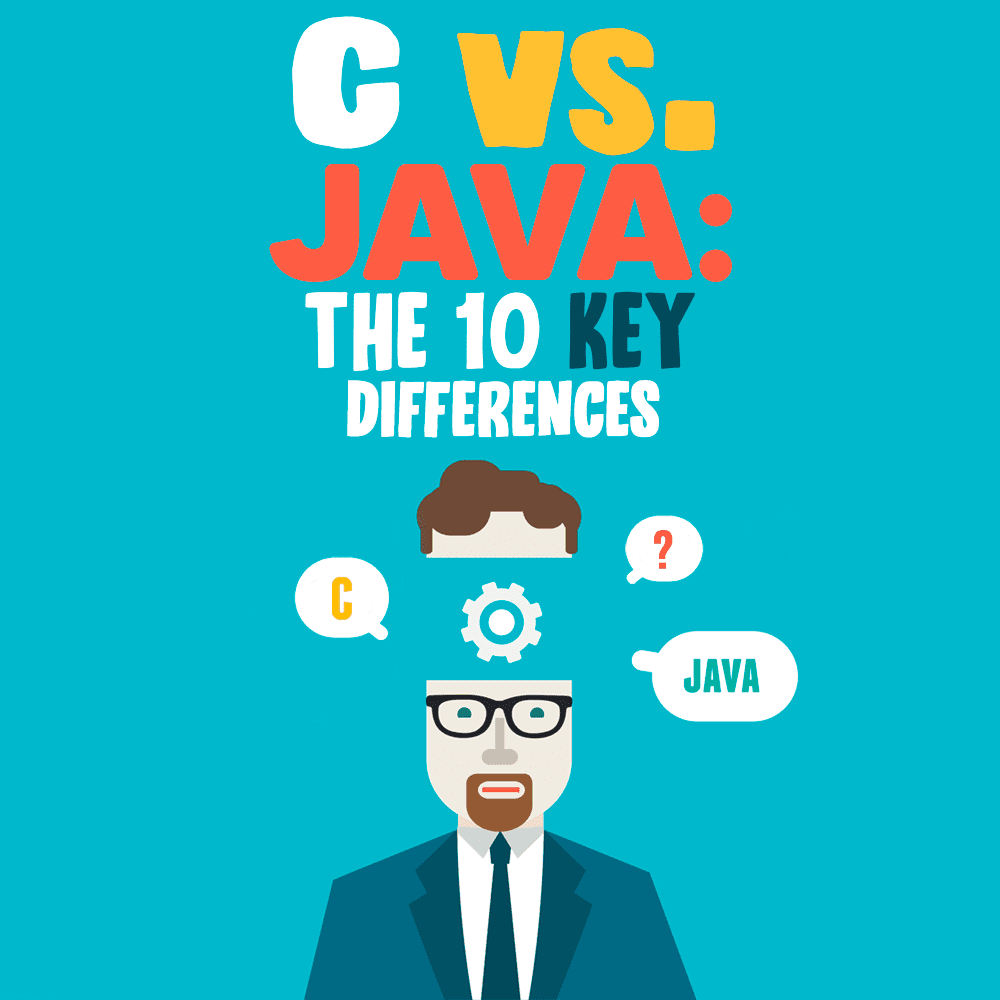 Both Java and C are powering some of the most robust enterprise platforms on the market. They have similar support, OOP, and syntax. This might have made you wonder which one is better—Java or C?
Both Java and C are powering some of the most robust enterprise platforms on the market. They have similar support, OOP, and syntax. This might have made you wonder which one is better—Java or C?
Perhaps, the answer depends on your purpose of learning, as you are about to choose between the two oldest programming languages still in mainstream use.
However, despite the similarities mentioned above, the truth is that Java and C are worlds apart. In this post, I’ll show you the key differences between them so that you can know what to expect from each.
The 10 Key Differences Between C and Java Programming Languages
C programming language is a general-purpose, procedural programming language that supports structured programming, recursion, and lexical variable scope with a static type system. At present, it's the most famous and fundamental language. Dennis Ritchie developed it at the Bell Lab in 1970.
On the other hand, Java is an object-oriented, interpreted, high-level language designed by James Gosling. Java is famous for its platform independence behavior and other uses like desktop computing, mobile app development, games, and numerical computing. As a result, it's one of the most influential programming languages of this time.
With these in mind, let’s now take a closer look at their key differences.
Architecture
C Programming Language is mid-level and combines both machine and high-level language. Since it is compiled, it converts code into machine language. Moreover, C is procedure-oriented and follows a top-down approach.
On the other hand, Java is a high-level, object-oriented programming language that transforms the code into machine language using a compiler or interpreter. In Java, codes transform into bytecode first, and then a virtual machine executes the bytecode. Thus, Java is an interpreted language, and Java follows the bottom-up approach.
Memory Management
C supports user-based memory management, while Java uses a garbage collector.
Java has automatic memory management functionality. When a program executes, it uses the memory in various ways. For example, objects live in the “Heap” part of the memory, which is involved in garbage collection. This assures that the heap has free space; it finds and deletes the object that can't reach it.
In addition, JVM (Java Virtual Machine) checks the size when it allocates any object. JVM mainly differentiates between large and small sizes, but this differentiation also depends on the JVM version, garbage collector, etc.
On the other hand, C programming has numerous memory allocation and management functions. The function is located in the header file <stdlib.h>. The function void calloc allocates the array of number elements, void free releases the blocks, void malloc allocates the array and leaves them uninitialized, and lastly, void realloc re-allocates memory, extending it up to a new size.
Paradigms
There have been different opinions on designing a programming language since the beginning of software development. As a result, each language has significant rules, concepts, and principles—called programming paradigms.
Both Java and C are multi-paradigms. For example, C is a procedural, structured, and imperative programming language. On the other hand, Java is an object-oriented, generic, imperative, and functional programming language.
If you build an application and want it to be fast, you can choose C. But, you should go with Java if you wish to have portability with a similar amount of speed.
Variable Declaration
C declares variables at the top of a block, but Java can declare anywhere. Again, C uses a free() variable to free up any variable, allowing deallocation of the memory block, and Java uses a garbage collector compiler.
After declaring a variable, Java sets bits in memory for that data type and allocates the name. Therefore, Java needs to declare the data type for further use and representation.
In the C programming language, you should declare a variable before its use. Unlike Java, C doesn't allocate memory while declaring variables. Notably, the C language has three types of variables: Local, Global, and Static. In addition, Java doesn't require pointer syntax, while C explicitly handles pointers.
C Variable Declaration:
#include <stdio.h>
void function()
{
int x = 10; // local variable
}
int main()
{
function();
}
Java Variable Declaration:
String name = “Alena”;
System.out.println(name);
Functions
A group of statements that perform together is a Function. In C programming, it's called Function, while in Java, Functions are known as Methods.
The Java method is a code called by its name, but it's associated with any object. You can pass parameters to methods and get some return value from them, but they will always be associated with some objects. Java supports exception handling.
In comparison, a function in C is just a piece of code that you can call anytime by its name and pass parameters to. You can also get the result from any function. The C standard library has various built-in functions like main(), strcat(), memcpy(), etc. C doesn't support exception handling, for which it often has issues with program flow maintenance. Java supports method overloading, while C doesn't support it.
Function declaration in C:
return_type function_name( parameter list ) {
body of the function
}
Method declaration in Java:
returnType methodName() {
// method body
}
Speed
The speed efficiency of a language depends on its usage. Primarily, the C language is developed for machine preference, so the code directly goes into the machines.
On the other hand, Java requires a Virtual Machine to transform bite codes into machine language and then deliver it to the machine. It adds an extra process and time. So, in that case, C is faster than Java.
Java is faster than C at runtime in only a few rare use cases because of its memory allocation. Java allocates the heaps separately, providing flexibility on data structure and automated garbage collection, which is above the level compared to C.
Security
In the case of security, memory corruption is the biggest category of high-security factors. Unfortunately, Java doesn't have any analog rules because of its type system that prevents memory corruption—which becomes harder in C.
Both C and Java have some rules in privilege escalations. However, while Java has an internal privilege system, C doesn't support it. As a result, you get static data hiding in C and private data hiding in Java.
If you choose between Java and C for a plugin inside a web browser, you should pick Java because Java often releases a vast number of security patches at a time.
Object Management
C offers manual object management while Java has automatic. C operators can manually create and destroy objects. On the other hand, Java largely depends on the garbage collection process for this job, and it takes some time to collect. But you cannot afford the risk of accidentally doing memory management in Java during a critical section.
Compilation

Learning Curve
The learning curve of a new language depends on the previous programming experience of the learner. If you are starting fresh, C should be the more straightforward language, as it has fewer concepts to learn, so you can catch the idea quite quickly and in a short time.
On the other hand, as an OOP, Java offers numerous features and can require a longer period to get your hands on all functionalities.
C vs. Java: Which One to Choose First?
It's wise to start learning an early language because the current languages are based on early language syntaxes. Likewise, Java has derived its syntax and several features from C and C++.
As C programming has fewer features, less complexity to learn, and is less prone to errors, it's wise to get your hands on C programming first. Then, later on, you can move to learning Java and other languages like C++, C#, Objective-C, or Python.
Learning C, you would have to learn more programming as you deal with the lower-level language of computer science and software development. Being object-oriented programming, Java is widely used for developing projects and other programming paradigms. It is also one of the highest-paying programming languages in the current world. Therefore, ultimately, you should choose the one that suits you.
